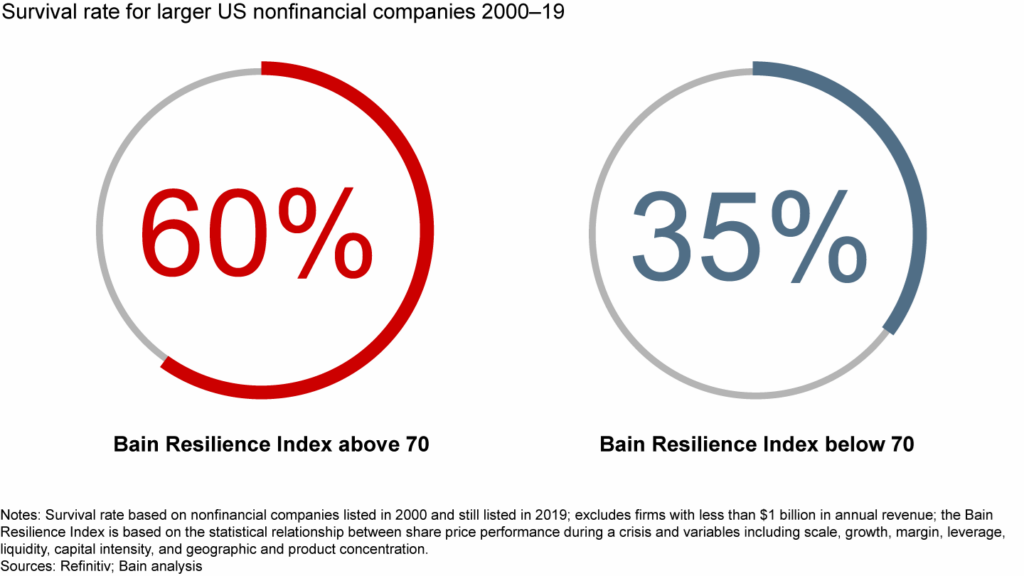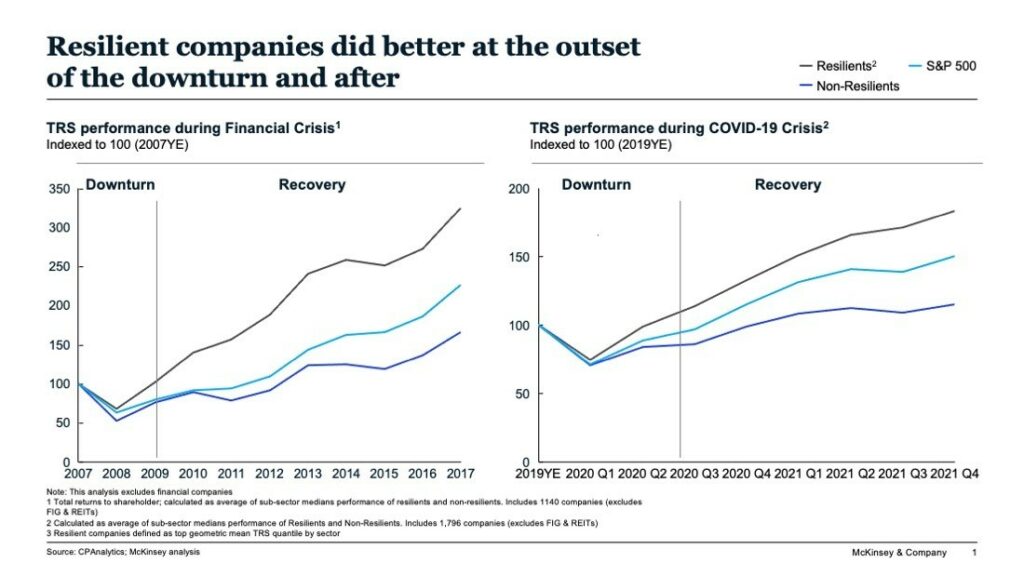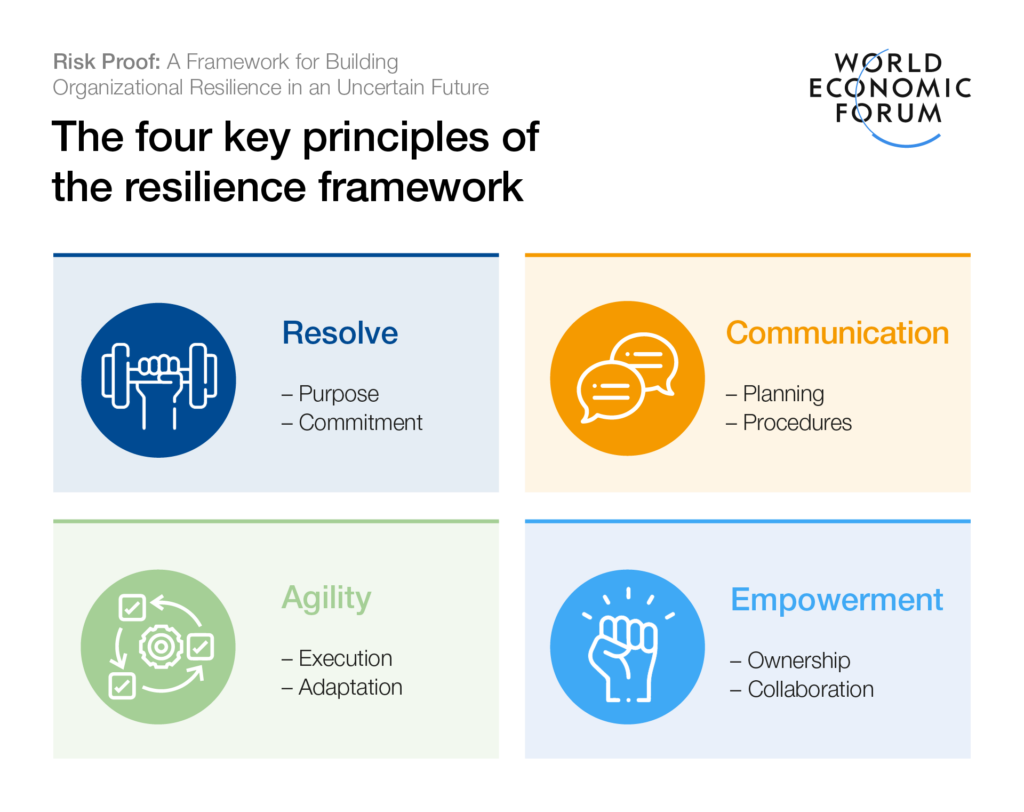After a decade of relative stability in European markets, it has become clear that the future will not simply return to normal and that managing crisis is now the new normal. As a result, resilience has become the top priority for CEOs around the world. But how can CEOs strengthen their companies’ ability to tackle a crisis, stay reactive under stress and bounce back stronger? We believe, that the company identity could be the compass that CEOs are looking for.
Niels Lunde, editor in chief at Børsen, and Sven Smit, chairman of the McKinsey Global Institute, discuss the start of this new era in the Børsen podcast “Topchefernes Strategi,” which requires new paradigms and a new narrative due to its structural differences. In the past, the paradigm of increasing profits through efficiency dominated. However, we now understand that streamlining our businesses has made them more vulnerable. So today, in November 2022, resilience is the top priority for global CEOs.
Resilience is the companies’ ability to survive a crisis and to bounce back stronger
Studies show that more-resilient companies have nearly double the survival rate.

A joint McKinsey and the World Economic Forum study found that “resilients” outperformed “non-resilients” in shareholder returns during the COVID-19 pandemic.

How to strengthen resilience in your organisation?
We need to figure out how to enhance our companies’ resilience and ability to tackle crises, stay reactive under stress and bounce back stronger. The World Economic Forum study shares four key principles for building and strengthening organisational resilience in your company. Striking to us is that behind these four key principles, we can identify people. Resilience is less about processes, supply chain or physical infrastructure. Instead, it is about employees, leadership and culture – about a shared sense of purpose, the mindset in the company, the inner coherence, the ability of employees to make their decisions and the understanding of their strengths to react fast.
Behind all four principles is the company’s understanding of its inner identity and ability to activate its identity as a compass to navigate and make critical business decisions.

Identity in a business context is understanding who you are as a company. It is “your reason to exist”, an understanding of the elements that make you unique in your market and a clear understanding of the value that you are offering. Through our work with identity for numerous companies and organisations, we have experienced the performance and organisational effect it has for companies to know their DNA and to activate their identity. At IDna Group, we have developed a process that helps companies fully understand their identity, and we have developed an Identity Compass, a tool that makes identity actionable. Our Identity Compass entails carefully selected key identity elements concerning the business strategy and serves the entire organisation as a guiding compass, navigating all kinds of business decisions.
Key Principle no 1: Resolve
The most important principle in the research from The World Economic Forum is “a shared sense of purpose and the company’s commitment to it”. And we could not agree more. A purpose can connect employees emotionally to the company and motivate them beyond their paychecks. In terms of a crisis, understanding that there is a deeper meaning to why the company should exist is crucial to activating the extra energy needed to get it back on track. This requires that the company’s purpose is strategically embraced and integrated into the entire organisation. Purposes that are mainly activated in branding and marking initiatives do not have the strength to keep the company together in the face of troubled times.
For us, having a clear, shared, and articulated understanding of why the company exist is the key element in a company’s identity and the centre of the identity compass. Several studies during Covid have shown that purpose-driven companies performed better during the lockdowns as they could use their purpose as a guiding star.
Key Principle no 2: Communication
In our identity projects, we always discover many divergent paradigms that co-exist in the company. Research has shown that paradigms, or how we understand the world, can limit our ability to see and understand a different perspective. If you can observe two intelligent people talking to each other without understanding each other, what you are experiencing is likely to be two people with divergent paradigms, often without knowing it.
Discovering, understanding, and changing counterproductive paradigms helps improve employees’ ability to communicate and understand each other, a key ingredient to come from a general commitment to a shared understanding of how to activate the company’s purpose.
Key Principle no 3: Agility
Agility is the ability to react fast. A company that is aware of its current way of operating, the spectrum of its unique DNA elements, and its culture has an increased ability to change its approach. In activating identity, we always set DNA elements in relation to the company’s business target. If the business target changes, the approach to achieving the target can be adjusted immediately. Companies trained to make decisions based on their Identity Compass are faster in resetting their priorities and understanding what it takes to achieve new ambitious targets.
Key Principle no 4: Empowerment
Staying reactive in times of stress and insecurity in a complex organisation requires employees to make decisions independently. Having an Identity Compass at hand makes it possible for every employee to stay actionable while still supporting the overall course of the company. Like this, the Identity Compass is not just the basis of the strategy and the identity in a nutshell but also an everyday tool for the entire organisation to perform self-management.
Investing in resilience to secure future business
One of the hardest tasks for CEOs is to decide what needs to be done here and now and what can wait. In terms of unpredictable, insecure times, investments seem risky and unnecessary. But there may be one investment that CEOs should consider, even in today’s time. The investment into their company’s resilience. Research from the Resilience Consortium of The World Economic Forum predicts that “investment in resilience could mean the difference between 1-5% GDP growth per year moving forward“.
We believe that CEOs already have access to the key ingredient in strengthening their resilience. It is their identity, the only sustainable asset that a company and organisation inherently own – everything else can be copied or bought. So strengthen your resilience by discovering your identity and defining your inner compass.
Contact
Related insights
Identity first: The key to lasting strategic impact
Many of us have heard the numbers… 60-70% of all strategies fail. And if we go all the way back…
Aligning the organisation for transformation and growth
After a busy time with exciting projects, we had the opportunity to reflect on one of our customers’ pervasive challenges.…
Crafting company names with an Identity-driven approach
In the dynamic realm of business, a company name is more than a mere identifier – it’s a powerful vessel…
In the pursuit of talent – how identity can help shape and strengthen your employer brand
Research shows that most leaders are facing severe challenges onboarding the right competencies to the company. In addition, many encounter…

